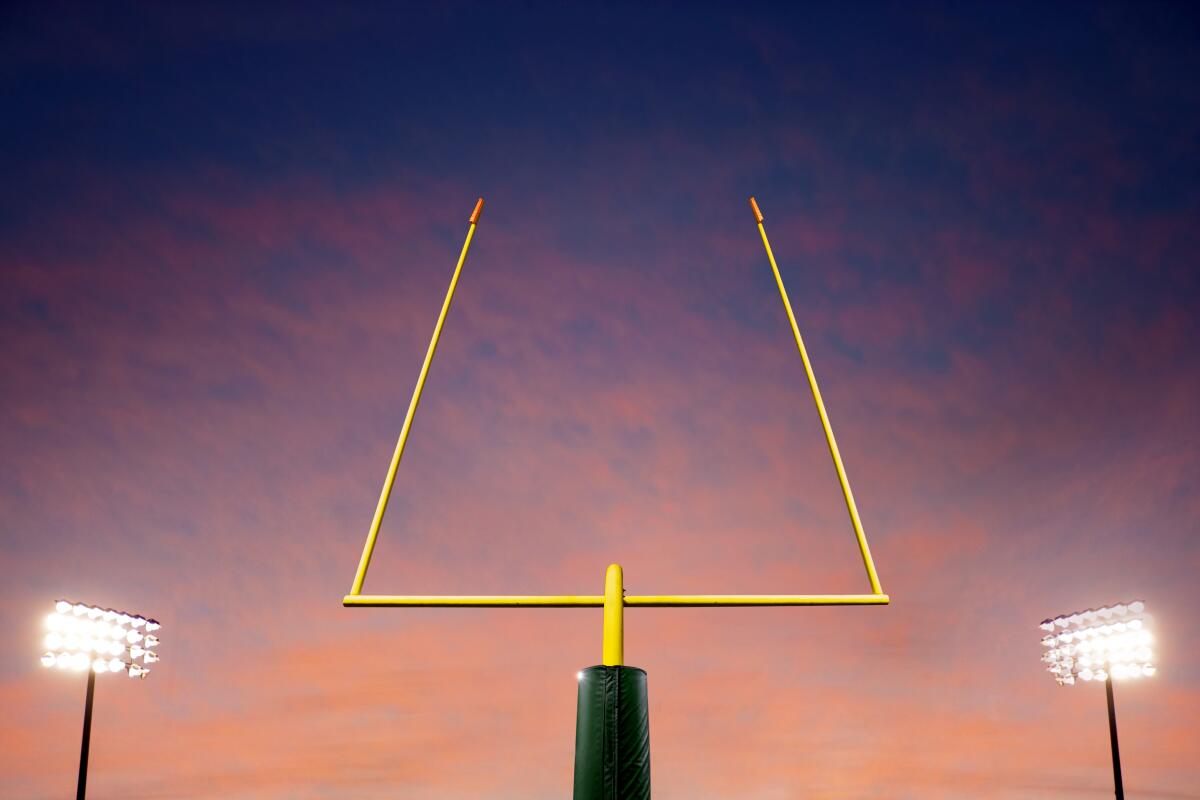My dad coached football for 30 years. His death gives the season a new meaning

- Share via
My sister texted when the games started: “I miss Dad.”
It’s the first football season without our father, and I miss him too.
Dad, a college and NFL football coach for 30 years — he was defensive coordinator, assistant head coach and special teams coach Joe Madden, not head coach John Madden — used to tell us, “The one thing you big turkeys can count on is change.”
His comment usually followed the announcement of a move to a new football team, ignoring any dissent from his noisy children in the peanut gallery. We grew up Cyclones, Wildcats and Panthers, to name a very few.
Now the change we can count on is his absence.
Last year, as memory and language were leaving him, Dad watched football from a wheelchair. He’d yell at the players on the screen, coaching still: “Pick it up! What are you doing?” — always peppered with profanity.
Dementia was gradual for Dad, but I knew the tectonic plates had shifted on a Monday night when I changed the channel from football to Turner Movie Classics. Greta Garbo was on the screen and all Dad said was, “Wow, would you look at her?” In the old days, fireworks would have erupted. Football ruled in our house. “It’s our bread and butter,” Mom would remind us when my sister and I complained.
The first signs of decline came on a family trip to Italy in the summer of 2017. Dad grew up in Washington, D.C., and he thought the Tiber River was the Potomac, and St. Peter’s Basilica was the Washington Monument. He’d doze off after a plate of linguini and wake to say, “At the Sugar Bowl we ran the zone defense against Georgia and —”
Mom said, “You’re in Rome! Snap out of it!”
After Italy, Dad got tested. The diagnosis: Alzheimer’s/stroke-related dementia.
Continually being mistaken for the child of a celebrity can be, well, maddening.
At first, things went along. Dad joined a senior center where they played bingo and danced. A van picked him up, and Dad liked the driver, Steve.
One morning, Dad said to Mom, “I need to let the defensive secondary know where practice is.”
Mom was exasperated, “There are no players, Joe! There have been no players since 1990.”
But Steve had a different strategy: “Hey, Coach, practice isn’t until Thursday.”
When Dad said, “I need to get in touch with Jon Gruden. I’m getting back into coaching,” Mom tried to tease him: “You intend to run the field again like in the old days? Maybe you ought to get out of that chair first and walk the dogs.”
But Dad didn’t walk the dogs, and the Raiders’ Gruden didn’t return his calls.
When Johnny Majors died — Dad coached with him on four teams — the headline connected: “That breaks my heart,” Dad said. But the next day it was: “Get Majors on the phone.”
Mom said, “Your father would hate this. I hate it for him.”
My brother Duffy stepped up. Mom washed Dad’s face, brushed his hair, and gave him breakfast. Duffy made him lunch and read to him — Vince Lombardi’s “When Pride Still Mattered” and Bear Bryant’s “The Last Coach.” My other brother in Chicago talked football with Dad on Zoom. As things grew harder, my sister found caregivers for a few hours a day, and then hospice.
The nurse interviewed Dad.
“What year is this?”
“Um…”
“Where do you live?”
“Pittsburgh.”
He had coached at the University of Pittsburgh in the 1970s. Mom sighed, “We were happiest there. Pitt won the Sugar Bowl.”
On a summer afternoon last year, I arrived in San Diego (our final team was the Chargers) and found him smiling. “How are you, Dad?”
“I’m great,” he said, eyes bright with joy. “I just talked to Ralph Hawkins.”
“Where?” (Ralph Hawkins died in 2004.)
“In heaven. Where else?”
Hawkins and Dad were boyhood friends in Washington who grew up to be football coaches.
“What did Ralph have to say?”
“I told him what I was doing and what I wasn’t doing. He listened. I told him to hug the hell out of my parents — ‘Would you do that for me, Ralph?’”
On Jan. 8, Dad slipped away, around noon, during a bustle of noisy activity. I couldn’t believe it, that he could just leave like that in the middle of Zoom calls, visiting nurses and, yes, football on TV. At least we didn’t have to say goodbye on an iPad like so many families during the pandemic.
A few months earlier, with the TV on, tuned to football, I had counter-programmed: “I love you, Dad.”
He winked and said, “I don’t blame you.”
The sound of a football game is the white noise of my childhood, and I learned to tune it out. Maybe I’ll turn on a game this year and just listen.
Kerry Madden-Lunsford divides her time between Los Angeles and Alabama, where she is a professor of creative writing at the University of Alabama at Birmingham. Her latest book is “Ernestine’s Milky Way.”
More to Read
A cure for the common opinion
Get thought-provoking perspectives with our weekly newsletter.
You may occasionally receive promotional content from the Los Angeles Times.









